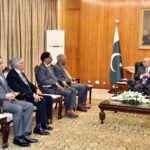NEW YORK, April 16 (APP): Pakistan’s Ambassador to the United Nations, Maleeha Lodhi, in a television interview broadcast Sunday, said the United States was in a unique position to defuse the tensions between India and Pakistan over the decades-old Kashmir issue as it had good relations with both countries.
Speaking in the television programme of World Affairs Council, a
Washington-based think-tank, she, however, said such a role required
a more balanced policy on part of the United States.
“Somebody needs to play this role and we think the United States
is the best position to do that,” the Pakistani envoy said. “I mean at
this point in time, for example, the situation in Kashmir – the long-standing dispute between Pakistan and India – is once again
inflamed; the situation is grave, it poses a critical threat to
regional peace and security and again, you know, what we like to see
is the United States not coming as a fire brigade to put out a fire,
but to come in at a time where it can avert any kind of crisis
from brewing and exploding actually.
“So I am not suggesting that’s about to happen but I am saying
before the next crisis happens this is a role of leadership that the
United States can play.”
Ambassador Lodhi said, “In recent years we in Pakistan have felt
that the United States lacked balance in its approach to South Asia,
and as a result we lost something in the relationship…”
She said the lack of balance was best represented in the nuclear
deal – the civilian nuclear deal that the Bush administration pursued
and in fact concluded with India – which was a discriminatory nuclear
policy towards the region and had consequences for it.
Asked whether a plebiscite in Kashmir could pave the way to peace,
Ambassador Lodhi referred to a series of UN Security Council
resolutions calling for enabling the Kashmiri people to determine their
own destiny that have not been implemented.
“We say and I have said that several times at the UN that the people
of Kashmir have waited for 70 years to see justice done to their cause,
to see Security Council resolutions being implemented, so we do believe
that the answer to the instability in our region, which is caused by primarily and principally the dispute over Kashmir, should be
resolved …”
“This is no piece of real estate that Pakistan and India is fighting over, this is about people, it is about the self-determination of the people and their right to their self-determination is enshrined in the UN charter in UN declarations and in UN Security Council resolutions all we say is allow the people of Kashmir to decide their future.”
Regretting the continuing tensions between India and Pakistan,
Ambassador Lodhi underscored the need for a dialogue to resolve the
Kashmir and other issues between the two countries.
“It is important that Pakistan and India sit down and find a peaceful
settlement of this issue to allow the people one fifth of mankind (living
in South Asia) to enjoy the fruits of peace,” she said. “Peace that other parts of the world has enjoyed, why should over a billion people be deprived of this.”
The Pakistan envoy also suggested that the new US administration back a peace process in Afghanistan for which Islamabad would be willing to play a role to end this war that has brought so much grief to the peoples of Afghanistan and Pakistan.
“We host so many refuges, and quite apart from that, it (the conflict) has destabilized large parts of the border,” she said, adding, “So I think in this region there is a lot that the United States can do and I think one of the mechanisms that has been evolved to help promote peace and a dialogue between the insurgents and the Afghan government in Afghanistan is called the Quadrilateral Coordination Group which brings together Pakistan, Afghanistan, China and United States.
“So I think if the new administration … fully backs this mechanism and, through this mechanism, is able to conclude Afghanistan’s long war,
it would make a huge contribution to regional peace and a huge
contribution to world peace.
“We’ve got to find a negotiated peace in Afghanistan—that is the consensus of the United Nations and that is the consensus of the international community. I know the United States is dedicated also to
this goal, but dedication may not be enough, it needs to be proactively involved in order to achieve and accomplish this goal.”
On terrorism, she outlined Pakistan’s policy to combat the menace in
detail, and said, “You have to deal with the underlying factors that
lead people towards radicalization and therefore the need to address disputes in our region because that leads to violent reactions.
“We should have a shared approach and yes at times you know some
countries don’t do it terribly well but the answer to that is not to demonize that country whichever country it may be but to say hey here’s how we can help you and here’s how you can help yourself. So I mean some of the lessons we have learnt is from our prolonged exposure to this threat and the fact that we have lost so many innocent lives in this fight. But let me tell you another thing, my country is determined to fight until we will eliminate the last terrorist from Pakistan.
“This is not something that we take lightly. This is something that we address very seriously but as I said we had to adopt a much more comprehensive approach to this phenomena rather than just rely on military means. Military means are important, necessary but not sufficient and I think that’s the lesson that the international community has also learnt.”
Pakistan urges US to help defuse tensions with India over Kashmir






